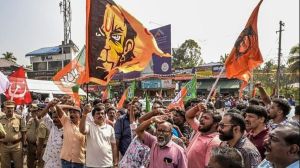Vandana Shiva on Maria Mies: Her stay in India helped her see that women’s work was economy’s foundation
German scholar and feminist Maria Mies passed away recently. Vandana Shiva, who co-wrote the book Ecofeminism with her, speaks about Mies and their work together.
 Maria Mies (left) and Vandana Shiva, co-authors of 'Ecofeminism'. (Photos: Wikimedia Commons, Express Archive)
Maria Mies (left) and Vandana Shiva, co-authors of 'Ecofeminism'. (Photos: Wikimedia Commons, Express Archive) Maria Mies, a Marxist Feminist scholar and academic, passed away on May 16 at the age of 92. For decades, Mies wrote extensively on how patriarchy, capitalism, and colonialism have exploited women as well as nature. The German activist had a long association with India, teaching at the Goethe-Institut in Pune from 1963 to 1967 and returning to the country several times. Her PhD thesis was published in 1980 under the title Indian Women and Patriarchy.
In 1993, Mies co-wrote the important book Ecofeminism with Vandana Shiva, scientist and activist.
Shiva spoke to The Indian Express about Mies and their work.
Please define ecofeminism for our readers
Ecofeminism is a worldview that recognises that humans are part of Nature, not separate. In their interconnectedness through life, Nature and Women are Alive and Autonomous, not dead passive objects to be exploited and violated by masculine power.
The creativity and productivity of Nature and Women are the foundations of all knowledge systems and all economies, even though they are invisible to the eyes of Capitalist Patriarchy.
How did Maria Mies’s work contribute to the field?
Maria was an organic intellectual. Her ideas grow from her experience. Her stay in India enriched her thinking to see that women’s work was the foundation of the economy. Over the years, her work evolved as an Ecofeminist, both through her contributions to the movement FINRAGE (Feminist International Network of Resistance to Reproductive and Genetic Engineering), and her aricultulation of the subsistence economy as the economy where nature’s economy and women’s economy meet to provide sustainable suspense to all
How does capitalism take away women’s control over farming?
Capitalist Patriarchy as a world view and a system of knowledge as well as organising the economy has been instituted over the last few centuries, through colonialism, fossil fuel industrialism, and the rule of violence, greed, and destruction of nature and cultures. Capitalist Patriarchy assumes nature is dead matter, and women are passive. The unit of capitalist patriarchy is the corporation, with the first corporation created as the East India Company in 1600.
The British empire was an empire of cotton, extracting $ 45 trillion from India, leaving a trail of famines.
Corporations are a patriarchal construct, made in the image of a rich white man. Corporations work for only one objective, profits.
They introduced war chemicals as agrochemicals in agriculture. They shaped the rules of WTO, which include the Intellectual Property Rights and ownership of seeds written by Monsanto [an agrochemical company], free trade in agriculture written by Cargill, and the Sanitary and PhytoSanitary agreement written by the junk food industry — Pepsi, Coke, Nestle.
Women have been the Seed keepers and breeders, most farmers are women, all artisanal food processing was in women’s hands. The Corporations entering agriculture have displaced women from the seed sector, from agricultural production, from food processing.
That is why I created Navdanya and the Mahila Anna swaraj movement, to keep Food Sovereignty in Women’s Hands
At the 1996 Food Summit, Maria Mies and I launched a global movement to keep food sovereignty in women’s hands.
How does climate change impact women disproportionately?
Climate Change is a consequence of capitalist patriarchy, the arrogance of denying that nature is living, and that women have knowledge to work and produce without fossil fuels and chemicals driving climate change. The first impact is the denial of women’s knowledge and economies. The second impact is the consequences of climate change in terms of increased intensity and frequency of cyclones, flooding, droughts. Women are the most vulnerable in times of climate disasters.
But as cocreators and ecological producers, women are also resilient. Women’s practices of resilience, such as conserving seeds of climate resilience, practising regenerative ecological organic agriculture, building local economies, show the path to mitigating climate impact, while building resilience to climate change.
Mies wrote Indian Women and Patriarchy in 1980. What is the one point from the book that you think is the most relevant today?
Maria showed us that capitalist patriarchy is an extractive economy that extracts the value women create and creates the illusion that capital is the creative force that creates wealth.
As told to Yashee
- 01
- 02
- 03
- 04
- 05





































